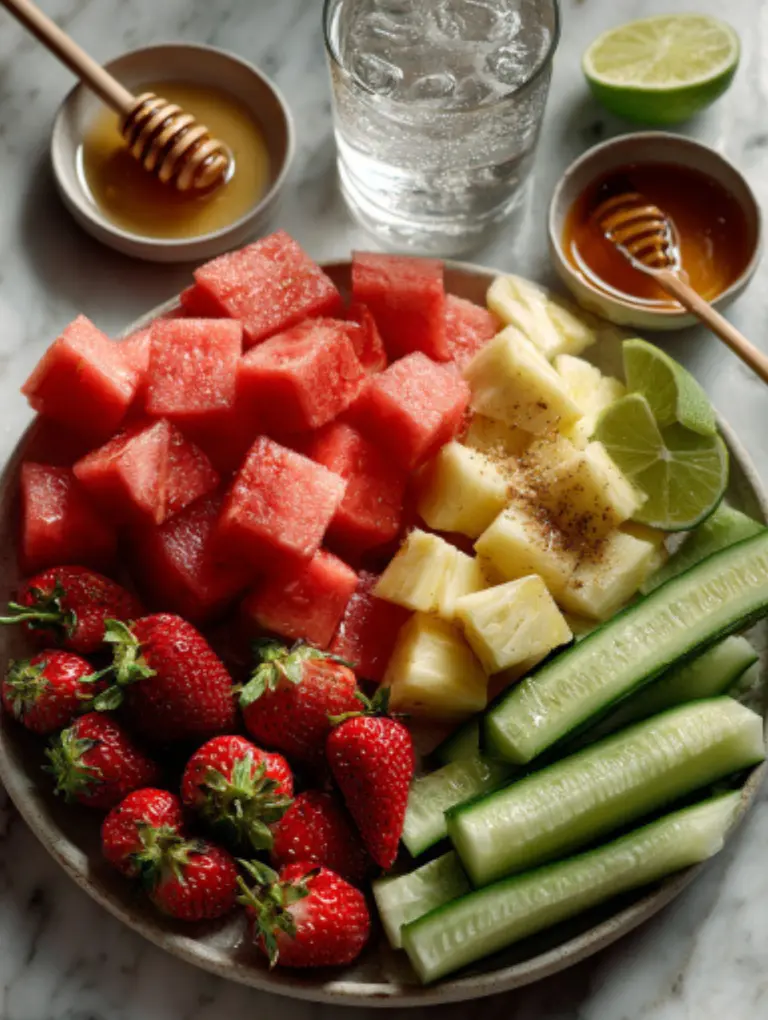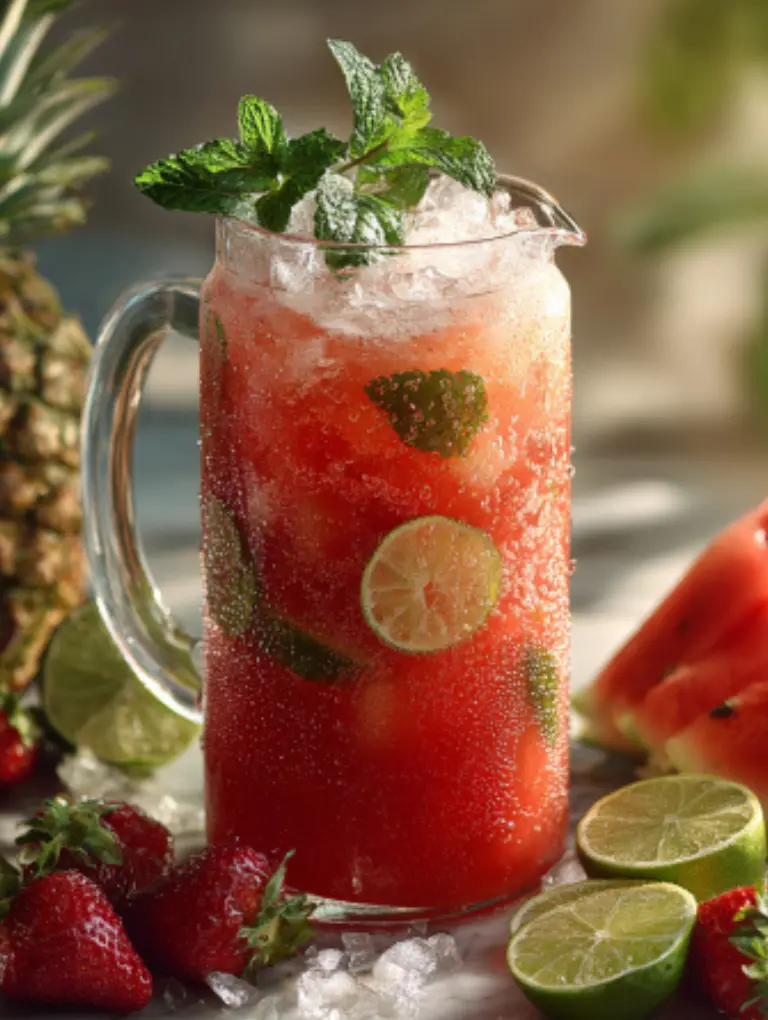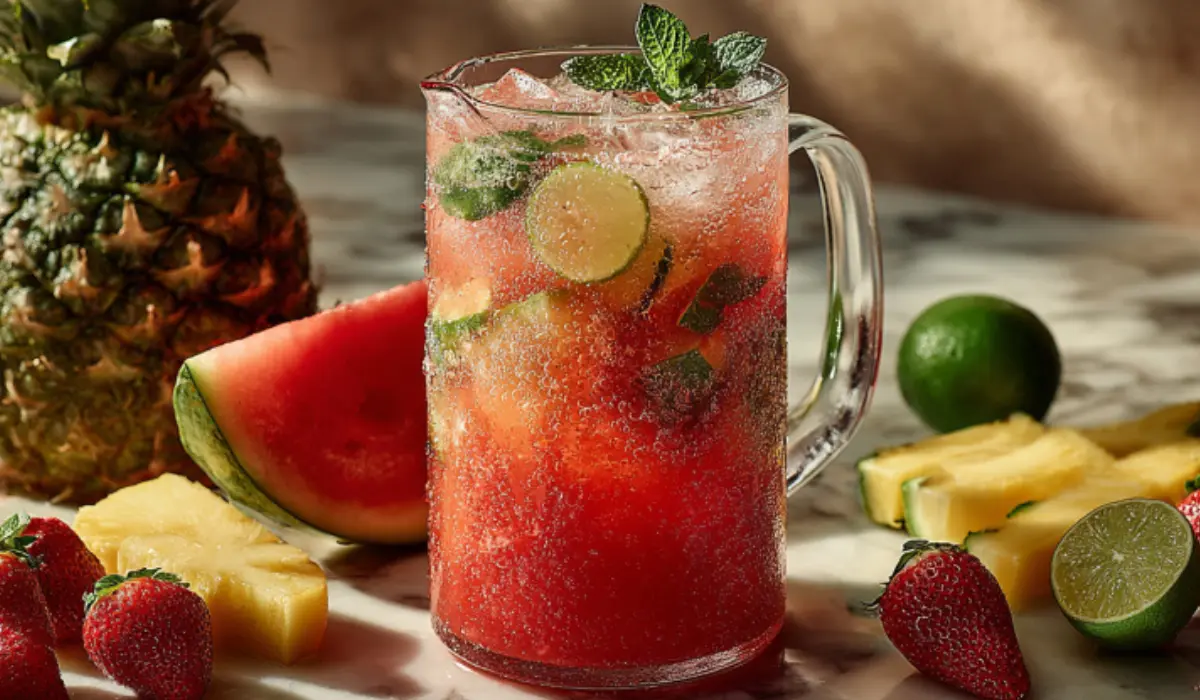There’s nothing more refreshing on a warm day than a tall glass of agua fresca Recipe. This simple Mexican drink blends ripe fruit, water, lime, and a touch of sweetness into a light and flavorful beverage you’ll want to sip all season long. Unlike heavy juices or sodas, this recipe keeps things crisp and hydrating, while letting the fruit shine. Best of all, it comes together in minutes, making it the perfect drink to impress guests or enjoy as a quick treat at home.
Table of Contents
Why You’ll Love This Recipe
- Quick and easy, five minutes of blending and you’re done
- Simple ingredients you already have: ripe fruit, water, lime, and a touch of sweetener
- Flexible base with clear ratios for watermelon, cucumber, pineapple, strawberry, and this hibiscus tea guide for a tart, ruby option
- Because it’s water-forward and lightly sweet, it supports hydration habits; the CDC recommends water for preventing dehydration and even suggests flavoring water with fruit or cucumber to make it more appealing
- Party friendly, scales cleanly for a pitcher or a full gallon without losing flavor
Ingredients Needed

For the Base
- 4 cups ripe fruit (watermelon, strawberry, pineapple, cucumber, or your choice), chilled and chopped
- 3 cups cold water for blending
- Juice of 1 lime for brightness
For the Sweetener
- 1 tablespoon maple syrup (or granulated sugar, honey, or agave)
- Start with a small amount, then taste and adjust
Optional Add-Ins
- Fresh mint or basil leaves for a herbal lift
- A slice of ginger for warmth
- 1 teaspoon chia seeds for texture and fiber
- A tiny pinch of salt to sharpen fruit flavor
Garnishes
- Lime wheels or fresh fruit slices
- Tajín or sugar on the rim of the glass for a festive touch
Equipment
- Blender (a high-speed one works best)
- Fine mesh strainer (optional, for smoother texture)
- Large pitcher
- Measuring cup and spoon
Notes & Substitutions
- Fruit choices: Juicy fruits such as watermelon and cucumber are about 92 percent and 96 percent water, which is why they need less added water, according to USDA-derived data compiled by MyFoodData.
- Sweeteners: Simple syrup blends evenly; honey gives floral notes; agave keeps things mild. Sugar-free? Try monk fruit or stevia.
- Frozen fruit: Works well if thawed slightly first gives a colder, thicker result.
- Budget-friendly swap: Use seasonal fruit or mix fresh with frozen to keep costs down.
How to Make Agua Fresca Recipe
Step-by-Step Method
- Prep the fruit
Wash, peel if needed, and chop your fruit into chunks. Chill it beforehand for a colder drink. - Blend everything together
Add fruit, cold water, lime juice, and your chosen sweetener to a blender. Start with less sweetener you can always add more after tasting. - Taste and adjust
Take a quick sip. If it needs more sweetness or lime, add it now. Keep in mind that drinks taste slightly less sweet when cold. - Strain (optional)
For a smoother texture, pour the blend through a fine mesh strainer into a pitcher. If you like a bit more pulp and fiber, skip this step. - Chill and serve
Refrigerate until cold or serve immediately over ice. Garnish with lime wheels or fruit slices, and rim the glass with Tajín for extra flavor.
Why Each Step Matters
- Chilling the fruit boosts the refreshing factor.
- Blending in stages avoids overworking the fruit and helps with even texture.
- Tasting before straining saves you from wasting sweetener adjustments.
- Straining or not depends on whether you want a juice-like sip or a smoothie-style sip.
- These blending tips show why blending in stages avoids overworking the fruit and helps with even texture.
Ratio Guide by Fruit Type
- Watermelon & cantaloupe: 4 cups fruit to 3 cups water
- Strawberry & mixed berries: 3 cups fruit to 3½ cups water
- Pineapple & mango: 3 cups fruit to 4 cups water
- Cucumber lime mint: 4 cups cucumber to 2½ cups water, plus lime and mint
- Hibiscus concentrate: Steep ½ cup dried hibiscus in 2 cups boiling water, strain, then mix with 3 cups cold water and sweetener
Quick Flavor Templates
- Watermelon Lime stays bright and classic with extra lime juice, and this mint and lime pairing shows an easy twist.
- Cucumber Lime Mint: Cooling and herbal, perfect for hot days
- Hibiscus Lemon: Tart and floral with a ruby-red color
- Pineapple Ginger: Sweet, tangy, with a subtle spice kick
- Strawberry Basil: Sweet berries balanced by aromatic basil
Pro Tips & Troubleshooting
Expert Tips
- Start light on sweetener. Cold drinks taste less sweet, so add sugar or syrup gradually and retaste after chilling.
- Add a pinch of salt. Just a tiny bit sharpens the fruit’s natural flavor and makes it pop.
- Use simple syrup. Dissolved sugar blends evenly and avoids grainy texture in the drink.
- Blend with a few ice cubes. This creates a frothy top layer that feels extra refreshing.
Common Mistakes to Avoid
- Over-sweetening early. Always taste after chilling before adding more sugar.
- Using warm fruit or water. This dulls the flavor and reduces the refreshing quality.
- Skipping the taste test. Every fruit varies in sweetness never assume the first blend is perfect.
- Over-blending herbs. A few pulses for mint or basil are enough. Too much and the drink turns bitter.
Quick Wins
- Sparkling finish. Top each glass with a splash of club soda right before serving.
- Fun rims. Roll glass rims in lime juice, then dip into Tajín or sugar for a party-ready touch.
- Make a concentrate. Blend fruit and sweetener without water, refrigerate, then dilute to taste when ready to serve.
Serving, Storage & Variations

Serving Ideas
- Pour into tall glasses over ice for the most refreshing sip, and borrow these lighter sweetness tips to keep the flavor crisp.
- Add lime wheels, cucumber slices, or fresh mint leaves as garnish.
- For parties, serve in a big glass dispenser with fruit slices floating on top.
- Try rimming the glasses with lime juice and dipping in Tajín or sugar for a festive twist.
Storage
- Keep homemade, non-pasteurized fruit juices like agua fresca refrigerated and plan to drink them within a few days, as advised by UConn Food Safety.
- Stir before serving, since fruit pulp and water may separate naturally.
- For longer storage, make a fruit concentrate (without water) and refrigerate for up to 5 days, then dilute before serving.
Reheating Methods
- This drink is always served chilled, but if it sits in the fridge too long, let it come slightly to room temp and stir before serving for best flavor.
Variations
- Sugar-Free: Swap sugar for monk fruit, stevia, or erythritol.
- Vegan: Use agave nectar or maple syrup as the sweetener.
- Spicy Mango: Blend mango with lime and add a pinch of chili powder.
- Tropical Twist: Mix pineapple with coconut water instead of plain water.
- Sparkling Agua Fresca gets a fizzy finish with club soda, and citrus and ginger add-ins can make it pop.
Nutritional Information
For context, 1 cup of plain watermelon has 46 calories and 12.5 mg vitamin C, per USDA-derived data compiled by MyFoodData, so your final numbers will vary with water and sweetener added.
| Nutrient | Amount per serving |
|---|---|
| Calories | 32 kcal |
| Carbohydrates | 8 g |
| Sugars | 6 g |
| Protein | 1 g |
| Fat | 1 g |
| Fiber | 1 g |
| Sodium | 6 mg |
| Potassium | 99 mg |
| Vitamin A | 432 IU |
| Vitamin C | 9 mg |
| Calcium | 13 mg |
| Iron | 1 mg |
Nutritional Notes:
- Values will change depending on the fruit and sweetener used.
- Pineapple or mango will increase carbs and calories slightly, while cucumber keeps it very low.
- Using agave, honey, or sugar substitutes will adjust the sugar content.
Tip: If you change ingredients or make a larger batch, you can double-check nutrition values with tools like Cronometer or MyFitnessPal.
Conclusion
Agua fresca is proof that the simplest things often taste the best. With just fruit, water, lime, and a touch of sweetener, you get a drink that feels light, crisp, and endlessly refreshing. The flexible ratios make it easy to adapt whether you prefer watermelon, cucumber, or pineapple, you can adjust in minutes to suit your taste.
If you try this recipe, let us know how it turned out. Leave a comment and a star rating so others can see your experience. And if you played around with flavors, we’d love to hear what variation you made first. Don’t forget to share this recipe with friends on Pinterest or Facebook so more people can enjoy it.
Frequently Asked Questions
What is the best agua fresca ratio for fruit to water?
Start with 4 cups fruit to 3 cups water for juicy fruits like watermelon. Use 3 cups fruit to 4 cups water for dense fruits like mango or pineapple. Adjust after tasting.
Do I need to strain agua fresca, and when should I skip it?
Strain if you want a smooth, juice-like sip. Skip straining if you enjoy light pulp and extra fiber. For seeds or gritty pulp, strain through a fine mesh.
Which sweetener works best, and how much should I start with?
Simple syrup blends evenly. Start with 1 tablespoon per batch, then taste. Add more in small amounts until the flavor pops.
Can I make agua fresca without sugar or with alternative sweeteners?
Yes. Try monk fruit, stevia, or erythritol. Add a little at a time, taste, and stop when it feels balanced.
How long does agua fresca last in the fridge, and can I freeze it?
Refrigerate for up to 3 days. Stir before serving since separation is natural. You can freeze the fruit base as ice cubes, then blend with water when ready.
Can I use frozen fruit, and how do I adjust the water?
You can. Let it thaw slightly, then blend. Add water slowly until it reaches a light, refreshing sip.
How do I scale agua fresca for a party or a gallon pitcher?
Multiply all ingredients by four for a gallon. Mix in a large pitcher, chill, and set sweetener aside for final tasting before serving.















